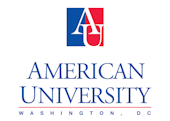
American University

In its 127-year history, American University has established a reputation for producing changemakers focused on the challenges of a changing world. AU has garnered recognition for global education; public service; experiential learning and politically active and diverse students; and academic and research expertise in a wide range of areas including the arts, sciences, humanities, business and communication, political science and policy, law and diplomacy, and governance.
Links
Displaying 301 - 320 of 383 articles

The share of board seats held by women varies dramatically across the country, from none in Alaska to close to half in New Mexico. A few key policies may make all the difference.

Together, two parties with a tough stance on immigration and the EU – the Five Star Movement and the League – received nearly 50 percent of the vote.

With many men ‘missing’ from the population in the aftermath of the 1918 flu, women stepped into public roles that hadn’t previously been open to them.

Decades ago, the CIA created a secret department dedicated to spreading anti-communist propaganda around the globe. A scholar explains how it is comparable to Russian meddling through social media.

Companies like Uber and Etsy don’t have to tell most of the people working with them how much they’ve earned. With the federal government so behind the curve, some states are changing their rules.

Citizen activists can influence the policy positions of their elected representatives. Their activism might well counter the advantages of the wealthy in America.

North and South Korea explained in five questions and answers.

North Korea has taken up the South’s invitation to the Olympics, but a quick look at the history of North-South talks suggests that unity is not as close as it may seem.

Why are people from some states so much healthier than others? Despite what you may hear, it’s not just about genetics or poor choices.

Dari algoritme pencarian Google hingga algoritme umpan berita Facebook tidak saja kompleks dan tertutup, tapi memang sengaja dibuat kabur.

If they pass a deal on DACA, it’s a win for both sides of the aisle and thousands of ‘Dreamers,’ but a loss for millions of undocumented immigrants.

Social media companies arose from libertarian, free-market origins but must embrace social benefits and democracy to survive.

Disney’s veneer of innocence shouldn’t distract people from recognizing the danger of giving one conglomerate the power to control so much information.

A researcher warns that the sugary treats of the holiday season can set the stage for children’s long-term health and academic success if left unchecked.

Wondering why Jerusalem matters so much? A 25-year veteran of the Israeli Foreign Service explains what you need to know.

Everything on the GOP wish list just became more daunting to achieve.

As the U.S. weakens its protections for internet users, it risks falling behind the rest of the world, which is embracing the importance of regulation to preserve an open internet.

If you own property and make less than US$200,000, the Republican tax overhaul is likely going to eliminate a tax deduction you use.

If Republicans don’t cut taxes on the wealthy when they have control of both houses of Congress and the presidency, what do they live for?

When Obama was president, Philippine President Rodrigo Duterte threatened to break up with America. Is it time to make up?
